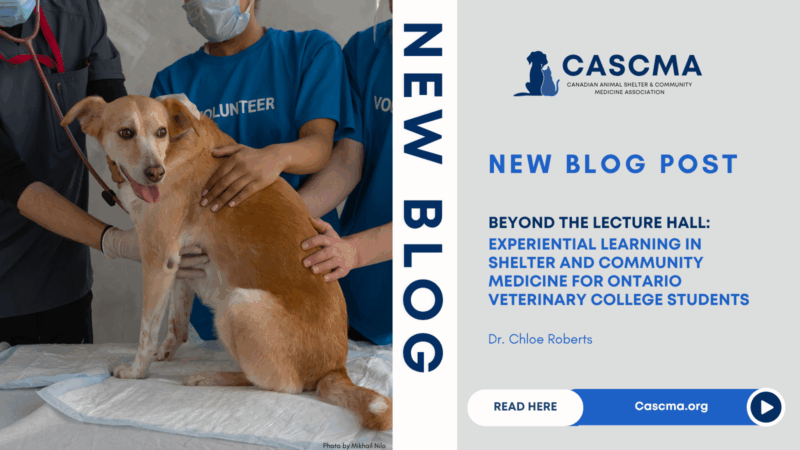
Written by Dr. Jamie Freeman-Braganca
We’ve all been there – recently graduated, knowing the answer to the multiple-choice question of how to treat a patient’s disease but finding out that the cost of care exceeds our clients’ resources. How differently might we have approached these cases had we been exposed to the realities of barriers to care earlier in our training? With the addition of community and shelter medicine experiences to the Doctor of Veterinary Medicine (DVM) curriculum at the Ontario Veterinary College (OVC), the next generation of Ontario veterinarians may yet find out.
Experiential Learning in the Curriculum
Increasingly, medical training among physicians has expanded to include experiential or community-engaged learning opportunities. (1) This pedagogical approach to teaching compliments didactic or lecture-based styles of instruction. Experiential learning opportunities, particularly those involving community service, allow for real-world application of theoretical knowledge and problem-solving, all while making meaningful contributions to the community.
In the fall of 2023, experiential learning opportunities in shelter and community medicine were added to the curriculum for phase I and II student veterinarians at the OVC. These experiences have been facilitated by team members from the Kim and Stu Lang Community Healthcare Partnership Program (CHPP). This team is made possible by an $18-million-dollar gift to the University of Guelph with the intention of expanding access to veterinary care and clinical training opportunities for student veterinarians.
The Nuts and Bolts of It
The first iteration of experiential learning began as a 4-hour shift where students were asked to sign up for experiences including shelter tours, assisting with community outreach appointments, nail trim clinics, etc. In the fall of 2024, the shifts were expanded to 8 hours, where students are transported to local animal shelters, community wellness or surgical clinics.
The CHPP veterinarians, myself included, work closely with shelter or community partners to facilitate discussions surrounding animal sheltering, trauma-informed care, spectrum of care, etc. Students are asked to set their own learning goals for the day, which most often include clinical or communication skills (e.g. administering a vaccine or collecting a history). With permission from clients, students are invited to participate in wellness appointments or perioperative patient care. Clientele for community clinics includes made-vulnerable populations, such as Indigenous communities and vulnerably housed or unhoused individuals.
Pearls of Learning in the Real World
Our goal is to create a safe and supportive learning environment where students feel empowered to ask questions and try something new. Throughout the day, students are offered real-time feedback as they practice their clinical or communication skills. At the end of the day, students are asked to reflect on their individual learning, as well as their impressions of shelter and community medicine. Resoundingly, students express an appreciation for the opportunity to put their classroom learnings to use. In my opinion, the magic happens when students reflect on the strength of the human-animal bonds that they witness. It is evident to me that these experiences challenge the common refrain that we so often hear, which suggests that only those of us with access to resources are deserving of the companionship of a pet.
Common themes of discussion include barriers to access to care, the challenges of cost conversations and what spectrum of care looks like in practice. In truth, the solutions to these dilemmas are rarely black and white, and we do not pretend to have all the answers. Our team hopes that, by starting these discussions early in their training, we will help better arm students with the tools necessary to provide evidence-based and culturally competent care.
References Cited:
- Pal D, Taywade M, et al. Experiential Learning: How Pedagogy is Changing in Medical Education. Cur Med Iss. 2022; 20(3): 198-200.
